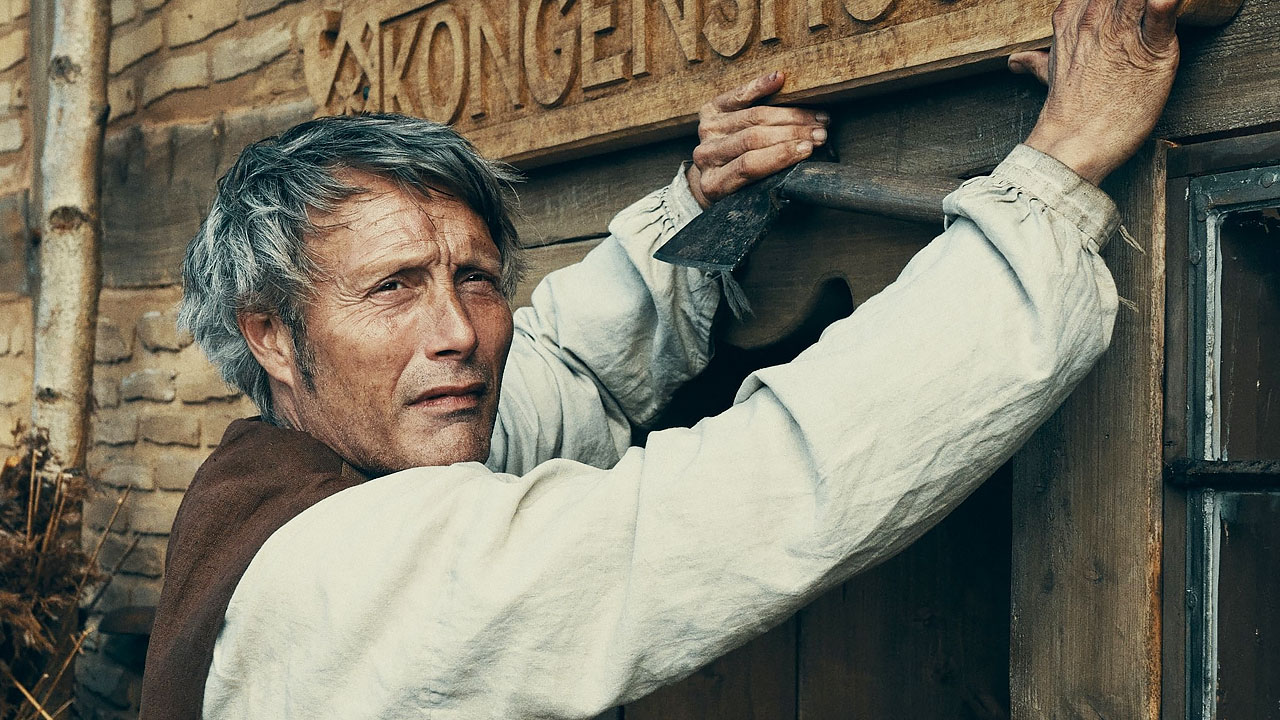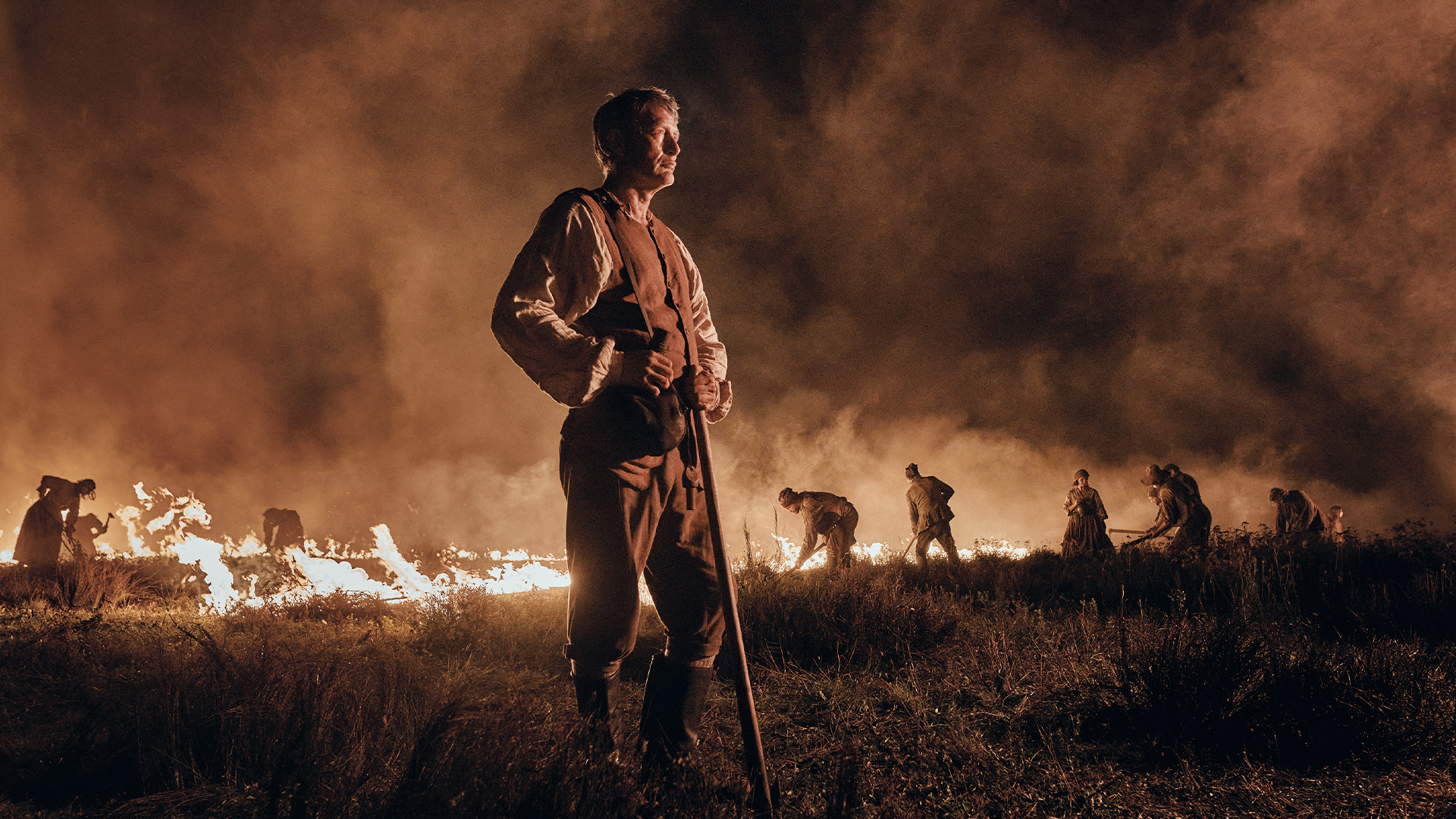Mads Mikkelsen is a badass potato farmer in engrossing period drama The Promised Land
Director Nikolaj Arcel makes a point that it’s not just the arid Danish land that’s troubled and treacherous: the people also suck.

A Danish David and Goliath story starring Mads Mikkelsen, The Promised Land proves fertile in the momentum of its historical yarn. Luke Buckmaster reckons growing potatoes has never been so “forcefully entertaining”.
Mads Mikkelsen is back, with those stony eyes and that dead fish gaze, looking eerily calm and continuously bothered—always ready to raise hell. In The Promised Land, an engrossing period piece honeycombed with pulpy action, the great actor plays a protagonist with a very particular, obstacle-fraught mission, of the kind we don’t often see heroes confronting: cultivating seemingly uncultivable land. The word “heath” is mentioned a zillion times in this film, describing acidic, splotchy terrain that’s not good for growing crops.
In a key early scene, armed with that hard-boiled countenance—intensely present but sort of absent, as if staring into another dimension—Mikkelsen’s former soldier Ludwig Kahlen appeals to the Royal Danish Court for permission to build on, and cultivate, barren Jutland land. He’s told he’s wasting his time—“the heath cannot be cultivated”—but permission is granted, with Kahlen to be made a noble if he succeeds. The attitude in the room is: good luck, chump.
Soon later Kahlen (who was a real person, but one assumes a hefty amount of fictionalising) gets right in there: fingers in the dirt, hands in the soil, connecting with the land. But don’t think this guy is some hippy-dippy peacenik humming Kumbaya; not 10 minutes of runtime elapses before Kahlen shoots an outlaw point blank in the face. His attacker, who had it coming, was born too early in time to have seen Mikkelsen in Hannibal (as the famous flesh-eater), or Indiana Jones and the Dial of Destiny (as a Nazi), or Casino Royale (as Bond villain Le Chiffre). That last film contains perhaps the most quintessentially Mikkelsen-esque exchange in all his work. When Le Chiffre is asked “do you believe in God?” Mikkelsen responds: “no, I believe in a reasonable rate of return.”
In that early, aforementioned moment of brutal retaliation, The Promised Land’s director Nikolaj Arcel (adapting Ida Jessen’s novel The Captain and Ann Barbara) makes a point that it’s not just the land that’s troubled and treacherous: the people also suck. Particularly the film’s Mephistophelian, utterly shitheadish villain Frederik Schinkel (a chillingly captivating Simon Bennebjerg), a local judge who falsely claims the heath as his own and will stop at nothing to dominate it, protected like a mad king by his status and privilege. He’s an evil son of a bitch but the weight of the film is clearly behind Kahlen, the flinty folk hero who’s dined with royalty but will never lose the common touch, and would prefer to die in a gutter then bow to a bully or despot. Plus, he’s got potatoes, and they’re pretty bloody resilient.

Giving Mikkelsen a more tender counterpoint to his pathologically driven farmer shtick is Kahlen’s romantic relationship with Ann Barbara (Amanda Collin), a former employee of Schinkel’s who fled his wrath but cannot completely escape. Pacewise the film hums along with a steady, well-judged momentum, underscored by a pot-boiling feeling that it’s arcing towards some big climactic event past which nothing can be the same. But small moments resonate too: when a sprig of greenery sprouts up, it feels like a wonderful, seismic event—a reminder that drama is relative and can be found everywhere.
Rasmus Videbæk’s icily crisp cinematography and Arcel’s stately direction grandly counter the humble, hard yakka aspects of the story, lending credibility to its pulpy elements and melodrama. At heart this forcefully entertaining film is a David and Goliath story: a tale of individual versus empire, Schinkel of course representing the latter while the actual empire—the royal kingdom—is presented as a kind of scaffolding, bending to the competing influences of stakeholders.
There’s also the question of land ownership: not who has it but what it signifies, beyond a success metric for Kahlen. The Promised Land is not a film that uses land to project hard-earned citizenry (like in Minari) or as a symbol of perversion (like in 1922). Arcel is ultimately more interested in pondering the points at which devotion to property and to people separate and converge. The heath struggles to grow anything; the film sprouts quite a lot.

























